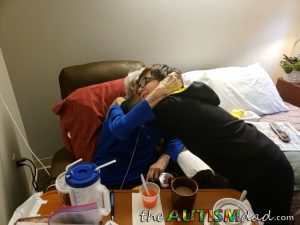The boys have this habit of leaving the kitchen cabinets open when they’re done rummaging through them. It sorta drives me crazy but it just isn’t a battle I choose to focus on.
You know, bigger fish and whatnot…
Anyway, yesterday (Friday) afternoon, Gavin was feeding Maggie and Maggie’s food and water bowls are in the kitchen. Specifically, they are below one of our main cabinets that the boys don’t shut.
Gavin bent down to pour the food in Maggie’s bowl and stood up quickly.
Unfortunately, that cabinet door was open and I couldn’t stop him in time and he absolutely cracked his head on the bottom of the door.
As far as head trauma goes, it wasn’t that bad. That said, I’m pretty sure it hurt like bitch.
Gavin was freaking out for a little while but he settled down and we iced it. Luckily he’s fine and he didn’t cut his scalp open, which actually was my main concern.
Anyway, the paramedic in me came out and was trying to assess him signs of head trauma, like a concussion. Childhood head injury can be so scary.
According to medical experts, severe injuries may lead to persistent cognitive challenges, impacting memory, attention, and problem-solving into adulthood. Emotional and behavioral changes can occur, including irritability, mood swings, or aggression.
Learning difficulties may arise, affecting academic performance, and cognitive impairments may lead to challenges in completing tasks. Motor skill deficits, impacting coordination and balance, can also result in requiring physical therapy.
Additionally, speech and language problems may occur if the injury affects language processing areas, necessitating speech therapy. Some children may develop seizures post-injury, particularly after moderate to severe traumatic brain injury.
I’m asking Gavin some questions and just sorta watching him for weird behavior but then something occurred to me.
What exactly qualifies as weird behavior for Gavin?
I love Gavin. I’ve raised him as my own since he was about a year old and later adopted him. I say this because I know how bad what I’m about to say is going to sound if taken out of context and I mean no disrespect to Gavin.
That being said, everything that Gavin says or does is weird. There isn’t a normal bone in his body and that’s not necessarily a bad thing but when it comes to looking for sort of erratic or confused behavior after hitting his head, this a problem.
Typically, when someone hits their head, I would be looking for signs of confusion. I would ask a series of questions to help establish whether or not they’re alert and oriented.
On a good day, Mr. Gavin lives in a state or perpetual confusion. He’s got him moments of lucidity but more often than not, he’s behaving and or speaking weirdly. He falls all the time and walking into things constantly.
As far as yesterday went, Gavin’s fine but it did sort of get me thinking about establishing some sort of process to help detect unusual, confused or concerning behavior in someone who’s status quo is unusual, confused and concerning….
This is something that I believe we all need to really think about because in the event of serious injury, EMS or ER staff will need some kind of guidance as to what normal for your child is..
Here’s a quick guide in managing head injuries
It is crucial to establish a baseline for normal behavior, particularly after a head injury. Documenting typical behavior, including speech patterns, movements, and daily activities, providing valuable insights for caregivers and healthcare professionals.
Clear instructions on preferred methods of interaction, triggers to avoid, and strategies for redirection or calming can significantly contribute to effective care for individuals with atypical behavior.
Identifying warning signs is a collaborative effort with healthcare professionals. This helps in recognizing potential distress or discomfort, enabling a proactive approach to the unique needs of individuals with atypical behavior.
It’s also crucial to maintain a comprehensive list of emergency contacts, relevant medical history, medications, and allergies. This information serves as a crucial resource for caregivers and emergency responders, facilitating prompt and informed care for individuals with atypical behavior.
Additionally, utilizing technology, such as wearable devices or medical alert bracelets, can convey essential information about individuals with atypical behavior in emergency situations.
Ongoing consultations with healthcare professionals contribute to an evolving care plan. This plan addresses the unique needs of individuals with atypical behavior and provides a framework for consistent, informed care.
Would you know what to say?
Does anyone have any experience with something like this? Has your special needs child ever had to go to the ER for injury or illness and the doctors want to know if anything is out of the ordinary? This is especially challenging for those with nonverbal children…
Please share your stories below and let’s get a discussion going..
This site is managed almost exclusively from my Samsung Galaxy Note 5. Please forgive any typos as auto-correct HATES me. 😉
If you like what I’m doing, PLEASE consider supporting my efforts. Click here to find ways you can help for FREE.



